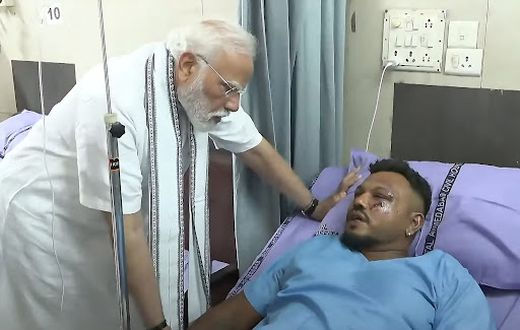In June, a harrowing air disaster left hundreds mourning and one British businessman, Vishwash Kumar Ramesh, battling the aftermath of unimaginable trauma. Ramesh, who hails from Leicester, found himself the only survivor out of 261 people aboard the ill-fated Air India flight that crashed under tragic circumstances.
The Crash That Shook Families Worldwide
Ramesh, age 40, was assigned seat 11A when disaster struck. While he survived with facial injuries and chest wounds, the price paid was devastating—his younger brother, Ajay, age 35, did not make it out alive. This loss, coupled with the horrifying experience of the crash, left Ramesh emotionally shattered. In the days that followed, he began receiving trauma counselling in India, where he remains for ongoing care.
Deep Psychological Impact and a Changed Life
The effects of the crash extend far beyond the visible injuries. According to Ramesh’s brother-in-law, who spoke with UK media, Ramesh is unlikely to ever return to Britain. “I think he will stay over there because he would be too frightened to get on a plane again,” he told The Daily Mail UK. Ramesh’s wife, Hiral, along with their four-year-old son, traveled to India to support him, but they have now returned to the UK as Ramesh continues his treatment. “He is still having treatment,” Hiral confirmed.
The Ripple Effect: Families Gripped by Confusion and Grief
The trauma of the crash is not limited to Ramesh or his immediate family. Many other British families who lost loved ones in the tragedy say they have faced not just grief, but also serious gaps in communication from authorities. Some families allege that the remains of victims have been mishandled—either mixed up or misplaced—intensifying the pain and uncertainty they feel as they seek closure.
Communication Breakdown: Pleas to Authorities
The anguish felt by the bereaved families has led many to collectively voice their dissatisfaction with both Indian officials and the UK Foreign Office. In a strongly worded letter addressed to Foreign Secretary Yvette Cooper, the families wrote: “Silence and a severe lack of communication force us to bring this to your attention. We feel abandoned.”
Seeking Accountability: The Legal Challenge
As families struggle for answers, some have initiated legal proceedings. Their current focus is to obtain access to Air India’s maintenance logs and pilot records, hoping to uncover the facts behind how such a catastrophic crash could have occurred. Many say they cannot move forward or find peace until they understand exactly what led to the disaster.
West African Perspectives: Echoes of Loss and Calls for Reform
Incidents such as the Air India crash resonate deeply within Nigeria, Ghana, and across Africa, where air travel is a growing but sometimes fraught sector. The tragedy is a stark reminder of the need for robust safety regulations, better cross-border cooperation in emergency response, and transparent support for bereaved families.
According to Abuja-based aviation analyst Emeka Ola, “We’ve seen similar challenges in Africa whenever there is an air disaster—a lack of timely information, inadequate communication with families, and lengthy investigations cause extended pain for those affected. Improving post-accident communication and victim support should be a top priority for all aviation stakeholders.”
Lessons and Questions for the Continent
The Air India tragedy prompts crucial questions for policy makers and the public alike:
- How can African countries improve their own aviation safety and investigative processes?
- What support systems exist for victims’ families, and how can they be strengthened?
- Could pan-African regulatory collaboration help reduce bureaucratic delays after aviation disasters?
Lagos-based legal expert Yetunde Babalola notes, “Legal action, such as seeking access to pilot and maintenance records, may offer lessons for bereaved families everywhere – accountability, transparency, and compassion must be part of the global standard.”
Emotional Healing and the Road Ahead
Recovering from such a traumatic event is a lifelong process. Mental health professionals across West Africa emphasize the importance of culturally sensitive trauma care, especially for survivors and witnesses of large-scale tragedies. Family counseling, peer support networks, and faith-based initiatives can play a valuable role as communities process such shocking events.
For Ramesh and families like his, the path to recovery is uncertain, made more difficult by unresolved questions and a feeling of abandonment from authorities. But their quest for truth and justice is also a call to reform aviation policies and support structures not only in India and the UK, but everywhere air disasters can strike.
Have Your Say
What changes do you believe are necessary to ensure better support for families after tragedies like this? Should African nations take new steps to guarantee aviation safety and transparency? Share your thoughts in the comments and stay with us for updates on this developing story.
For support, feedback, or questions, reach out at support@nowahalazone.com.
Stay connected: Follow us on Facebook, X (Twitter), and Instagram for the latest news and community updates!










